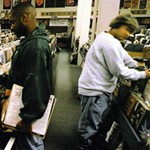DJ Shadow on Afrika Bambaataa
Sampling the godfather turntablist
By Abby Johnston, 4:20PM, Thu. Sep. 11, 2014
The vanguard of mainstream mixology, DJ Shadow, was given access by Cornell University to 40,000 records belonging to the man who introduced the art form to music: Afrika Bambaataa. Shadow, born Josh Davis in San Jose, Calif., 42 years ago, and his partner in scratch, Cut Chemist, spin their findings for ACL Live at the Moody Theater next Thursday, Sept. 18.
Austin Chronicle: Where am I reaching you today?
DJ Shadow: I’m in Boston.
AC: Tell me a little bit about how you and Cut Chemist got access to Afrika Bambaataa’s collection.
DJS: We were invited by Cornell University. Cornell had purchased Bambaataa’s collection early last year, and we were approached I think primarily because of Brain Freeze. Someone was a fan of Brain Freeze, which was a mix that Cut and I had done in the late Nineties. The first thing Cut and I said was, “This sounds incredible.”
But we wanted to make sure Bam’s cool with it. So we got his blessing and everything was on the up and up. The thing was to take a look at the collection and make sure everything was intact and make sure everything was what we hoped it was. And it was.
AC: Going through it all must have been a daunting task.
DJS: Well, Cut and I both have fairly big collections, so the prospect of going through large quantities of vinyl wasn’t daunting to us. The only thing that was daunting was trying to go through that amount of records, scrutinizing each one, and determining if it needed further exploration. In other words, if we didn’t know it and it was something that we needed to listen to. We only had about two days to make all of those determinations.
I think that in the process of putting the set together, we pulled maybe 2,000 records out of the collection as something we wanted to use or something we didn’t know. From that we pared it down to maybe 700 or 800 records that we were going to build the set from. It seems easy, but it wasn’t [laughs].
It was time consuming. We really wanted to nail it. We wanted to express our admiration and the respect we have for Bambaataa as a recording artist, and as a DJ, and as the missionary that he’s been for hip-hop culture for the last 40 years.
AC: Anything in the collection that was particularly intriguing to you?
DJS: On a nerdy, collector basis there was a lot of stuff that was unreleased from pretty pivotal, old-school rap groups from the early days of hip-hop. There were demo versions of his own songs that were kind of revelatory to us. There were break mixes that he’d edited together and pressed up for himself.
I think one of the things that I respected about the collection and that I was anticipating about the collection – and it was rewarding to see that it was the case – was just the wide scope of music that he included and that he sought for his collection.
In a lot of ways, his collection is a physical representation of what New York sounded like in the Seventies and Eighties. He had salsa, he had Soca, he had reggae, dub, go-go, New Wave. Anything that was happening within any community around him. It was cool to see his records reflect that.
AC: Once you sat down with the 700 or so records, was there anything that you really wanted to highlight from the collection?
DJS: Yeah, definitely. We had probably 50 to 100 records that we considered absolute musts. Among those would be Trans-Europe Express by Kraftwerk, which he famously re-played to create “Planet Rock.” I wanted to have a Miami bass record in there, because Miami bass is one of the many genres that wouldn’t exist if he hadn’t made “Planet Rock.”
There were a lot of records that we wanted to use as ties to demonstrate what inspired him and what he used to inspire people who may not know the history – music that would really connect the dots for people. We also wanted to use a lot of his really famous breaks like “Apache” by the Incredible Bongo Band. We wanted to play “It’s Just Begun” by the Jimmy Castor Bunch, because it’s a B-Boy anthem going back to the early Seventies and helped bring about B-Boy culture as we know it.
Things that were really big cultural signifiers and really spoke to him were absolute musts.
AC: You’ve said you wanted to highlight Bambaataa as a peacemaker, too. How did you incorporate that?
DJS: There was a lot of spoken word in his collection, too. A lot of people like Malcolm X, the Last Poets, Jim Ingram – a lot of socially aware, political spoken word. We felt that all of that contributed to his ideas as a musician and as a human being.
You can find in those records a lot of the themes that I think he pursued as someone who was given a position of influence within the industry. He was constantly trying to improve his community and improve the lot of people around the world who were oppressed. He made a record about South Africa.
These were issues that were important to him, and we wanted to touch on a lot of those artists that he had in his collection and play them in the set. We didn’t want to get caught up in the electro and the more obvious gifts that he gave people in the Eighties. We wanted to touch on the more intellectual side of what he was doing as well.
AC: You said you spoke with him before you started to get his blessing. Were you in any contact with him throughout the process or after?
DJS: No, because he tours a lot. I think, to him, this isn’t the first time other DJs have touched his collection. People like Jazzy Jay, people like Grand Wizard Theodore. I’m sure people like Red Alert and Chuck Chillout have borrowed records from him in the Seventies and Eighties.
I know he sees this as an honor. I hope he’s going to be at the New York show tomorrow. He looks at it as an honor, but he’s still looking forward and moving forward. I think he has a healthy attitude about it.
A note to readers: Bold and uncensored, The Austin Chronicle has been Austin’s independent news source for over 40 years, expressing the community’s political and environmental concerns and supporting its active cultural scene. Now more than ever, we need your support to continue supplying Austin with independent, free press. If real news is important to you, please consider making a donation of $5, $10 or whatever you can afford, to help keep our journalism on stands.
Chase Hoffberger, April 11, 2014
Luke Winkie, Nov. 9, 2013
April 19, 2024
April 5, 2024
DJ Shadow, Afrika Bambaataa, Planet Rock, Cut Chemist, Brain Freeze, Trans-Europe Express, Kraftwerk, Incredible Bongo Band, Jimmy Castor Bunch, Malcolm X, the Last Poets, Jim Ingram, Jazzy Jay, Grand Wizard Theodore, Red Alert, Chuck Chillout











